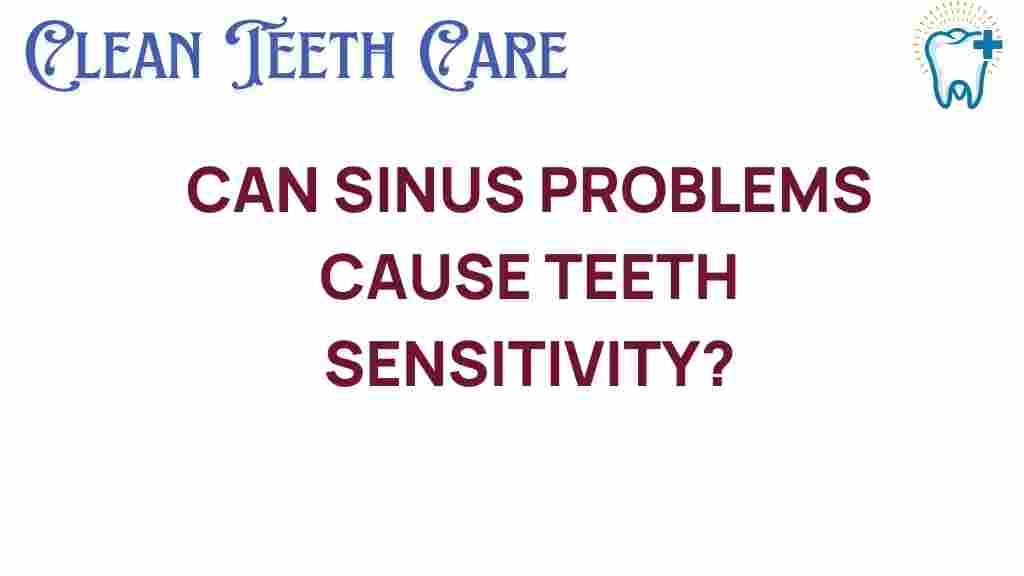Sinus Issues and Tooth Sensitivity: What’s the Connection?
Many individuals experience sinus problems at some point in their lives, and it’s not uncommon for these issues to manifest in unexpected ways. One such manifestation is tooth sensitivity. This article will delve into the connection between sinusitis and oral health, exploring how sinus problems can lead to tooth sensitivity and what can be done to manage these symptoms effectively. Understanding this connection is crucial for maintaining good dental health and overall well-being.
Understanding Sinus Problems
Sinus problems, particularly sinusitis, occur when the sinuses become inflamed or infected, often due to allergies, infections, or other irritants. This inflammation can lead to a variety of symptoms, including:
- Facial pain or pressure
- Congestion and nasal blockage
- Headaches
- Postnasal drip
- Fever
Sinusitis can be acute or chronic, with chronic sinusitis lasting longer than 12 weeks and often requiring medical intervention. Understanding the symptoms of sinusitis is essential for effective pain management and treatment.
The Link Between Sinusitis and Tooth Sensitivity
Tooth sensitivity is a condition where individuals experience discomfort or pain in one or more teeth, often triggered by hot, cold, or sweet stimuli. The connection between sinus issues and tooth sensitivity can be attributed to several factors:
- Pressure and Inflammation: The sinuses are located close to the upper teeth. When the sinuses become inflamed, they can create pressure on the roots of the upper teeth, leading to discomfort.
- Postnasal Drip: Sinus problems can cause mucus to drain down the throat, which may lead to irritation of the gums and teeth.
- Infection Spread: In some cases, an infection in the sinuses can spread to the teeth, causing pain and sensitivity.
Recognizing this connection is crucial for individuals experiencing both sinus issues and tooth sensitivity, as it can help in seeking appropriate healthcare.
Symptoms to Watch For
When dealing with sinus problems and tooth sensitivity, it’s important to recognize the symptoms that may indicate a deeper issue. Look out for:
- Tooth pain that coincides with sinus pressure or congestion
- Pain in the upper teeth when bending over or lying down
- Gum swelling or tenderness
- Frequent headaches along with oral discomfort
If you experience these symptoms, it may be time to consult with an ENT specialist or a dentist for a thorough evaluation.
Diagnosis and Treatment Options
Diagnosing the connection between sinusitis and tooth sensitivity typically involves a comprehensive approach. Here are the steps often taken:
- Medical History: Your healthcare provider will ask about your symptoms, medical history, and any previous sinus or dental issues.
- Physical Examination: An examination of your nasal passages and teeth may be performed to assess for signs of inflammation or infection.
- Imaging Tests: In some cases, X-rays or CT scans may be necessary to visualize the sinuses and dental structures.
Once a diagnosis is made, treatment can proceed. Options may include:
1. Managing Sinus Problems
Treating sinusitis is crucial for alleviating tooth sensitivity. Common treatment options include:
- Decongestants to reduce nasal congestion
- Saline nasal sprays to keep nasal passages moist
- Antihistamines for allergy-related sinus problems
- Antibiotics if a bacterial infection is diagnosed
2. Addressing Tooth Sensitivity
For tooth sensitivity, treatments may involve:
- Fluoride treatments to strengthen tooth enamel
- Sensitivity toothpaste to reduce discomfort
- Dental sealants to protect sensitive areas
In more severe cases, dental procedures may be necessary to address underlying issues.
Pain Management Strategies
Managing pain from both sinus problems and tooth sensitivity can be challenging. Here are some effective strategies:
- Over-the-counter Pain Relievers: Medications such as ibuprofen or acetaminophen can help alleviate pain.
- Warm Compress: Applying a warm compress to the face can relieve sinus pressure and improve comfort.
- Hydration: Staying well-hydrated can thin mucus, making it easier to drain and reducing pressure.
Consulting a healthcare professional for a personalized pain management plan is also advisable.
Preventative Measures for Better Oral and Sinus Health
To maintain optimal dental health and minimize the risk of sinus issues, consider the following preventative measures:
- Regular Dental Check-ups: Visit your dentist at least twice a year for cleanings and exams.
- Practice Good Oral Hygiene: Brush and floss daily to keep your teeth and gums healthy.
- Manage Allergies: If you suffer from allergies, managing them can reduce the risk of sinusitis.
- Stay Away from Irritants: Avoid smoking and exposure to second-hand smoke, which can exacerbate sinus problems.
For more information on maintaining dental health, you can visit this resource.
Troubleshooting Tips for Sinus and Tooth Sensitivity Issues
If you find yourself struggling with sinus problems and tooth sensitivity, here are some troubleshooting tips:
- Identify Triggers: Keep a journal of your symptoms to identify potential triggers for your sinus issues.
- Stay Consistent with Treatment: Follow through with prescribed treatments for both sinusitis and dental care.
- Seek Professional Help: Don’t hesitate to reach out to an ENT or dentist if symptoms persist or worsen.
Recognizing the interplay between sinus issues and oral health can lead to better management of both conditions, resulting in improved quality of life.
Conclusion
In conclusion, sinus problems and tooth sensitivity share a significant connection that can impact an individual’s overall health. Recognizing the symptoms and understanding the underlying causes can lead to more effective treatment and pain management strategies. By maintaining good oral health, managing sinus issues proactively, and seeking appropriate healthcare, individuals can improve their quality of life and reduce discomfort.
For anyone experiencing these interconnected issues, remember that timely intervention and a multidisciplinary approach can help alleviate symptoms and restore comfort. Stay informed, and don’t hesitate to seek help when needed.
This article is in the category Conditions and created by CleanTeethCare Team
